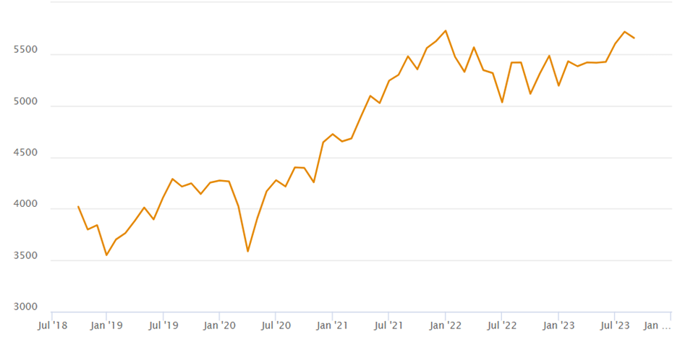It would be fair to say that 2023 has provided plenty of uncertainty for investors. Stubbornly high inflation has meant interest rates have continued to rise, and the economic uncertainty created in part by the ongoing war in Ukraine has taken its toll on the stock market.
In September, Reuters revealed that Make UK, one of Britain’s main manufacturing trade bodies, cut its forecast for the sector's growth for remainder of the year and 2024. The article points to a ‘cocktail’ of rising interest rates, cost of living and slowing overseas markets as the main drivers behind the sluggish outlook.
Little surprise then, that investors continue to see plenty of ups and downs in 2023, something you may have already seen if you’re one of them. Another article by Reuters revealed that British investors withdrew £1.19 billion from stocks (otherwise known as equities) in August 2023 alone.
While selling your investments when the markets get the jitters may sound like a shrewd financial strategy, in reality it could cost you dearly in the long term. With this in mind, read on to discover three powerful ways to survive a stock market downturn, and why selling to limit losses might be something you bitterly regret.
Hold on to your investments
All too often, a knee-jerk reaction to a stock market downturn is to sell investments. While understandable it could turn a paper loss into an actual one, which in turn could reduce your wealth.
To demonstrate this you might want to consider the following illustration, which shows the performance of the MSCI World Index in the five years up to September 2023. The index tracks the performance of a basket of companies across 23 developed nations.

Source: MSCI
As you can see, while the index suffered several downturns throughout the period, overall it made significant gains in the five years. This means that if you had decided to sell your investments in the first half of 2020 during the Covid pandemic to limit losses, for example, you would have locked in substantial losses and deprived your money of the chance to recover when the index later bounced back.
Additionally, your money would have missed out on the growth potential it could have enjoyed as the value of the index started to rise. This is why staying calm and holding on to your investments instead of selling them during a downturn is often the better plan.
Please remember that investing carries risk, and you may receive less than you originally invested.
Take a long-term view
If you’re an investor you should always expect short-term downturns in the markets. While it can be unnerving when they happen, it’s usually best to resist the temptation to sell your investments and focus on your long-term investment strategy.
Doing this means you’re more likely to see any downturn as the natural ebb and flow of investing and hold on to your investments, providing them with the potential to recover when the market recovers.
This is backed up by research carried out by Nutmeg in 2022. It studied equity markets in developed countries between 1971 to 2022 and found that holding an investment for three years resulted in a 20% chance of losing money on your investment.
Holding on to your investments for 13 years, on the other hand, reduced the probability of a loss to almost zero. That said, past performance is no guarantee of future performance, and you may receive less than you originally invested no matter how long you’re invested for.
Ensure the level of risk is right for you
Investment portfolios typically contain different types of funds and assets including stocks, government bonds, cash and in some cases property.
Over time these funds and assets increase or decrease in value, which can then skew the original level of risk of the investment your money’s in. This means your cash could be exposed to lower growth potential or higher risk of losses when the markets suffer a downturn.
With this in mind, rebalancing your investments to ensure the level of risk your investment’s exposed to is where it should have originally been could help to lower the risk of potential losses when the market drops.
A financial adviser can assess your attitude to risk and confirm whether the investment you’re in is still appropriate for your risk profile. If it isn’t, they can recommend alternatives that are, and move your money to funds that offer potential growth while maintaining a level of risk you are comfortable with.
Get in touch
As investing is about buying at a low price and selling at a higher price, you may even want to consider investing when the market takes a downturn. This is because stocks can be bought for less, which means you may be able to increase your overall growth potential.
As one of the UK’s largest independent financial advice companies, we’ll be happy to discuss whether this might be an option you want to consider.
If you have investments and would like to discuss your options, please call on 01527 577775 or speak to one of our advisers, as we’d be happy to help.
Monday 23 October 2023